Understanding the ACS Final Exam
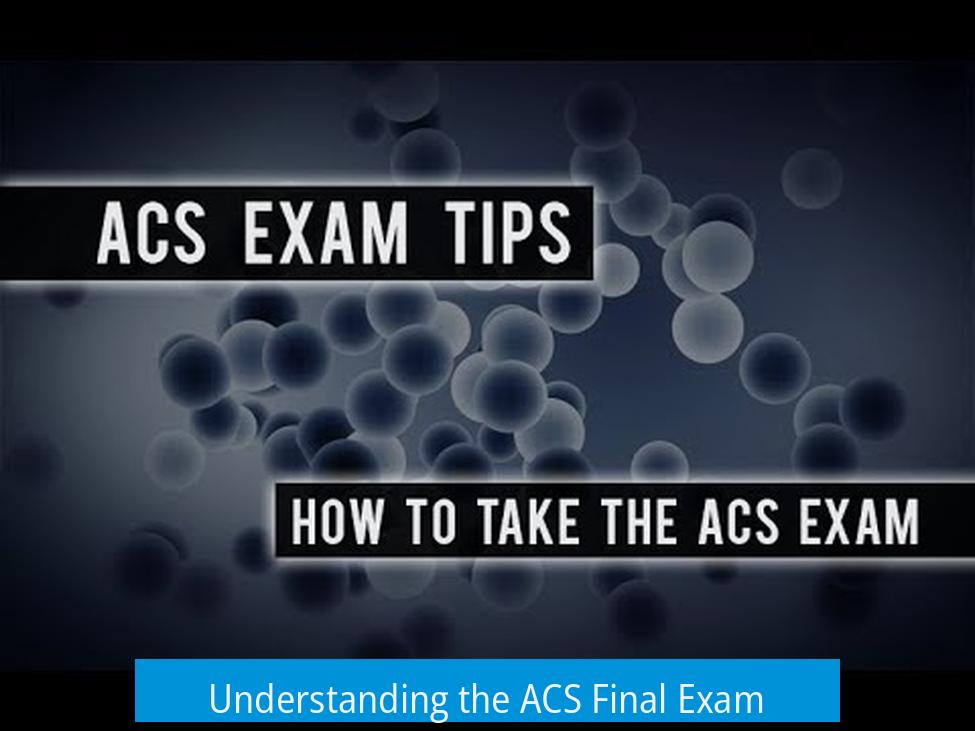
The ACS Final is a tough, standardized organic chemistry exam designed to objectively compare students nationwide. It pits students from diverse educational backgrounds, including those from top-tier universities, against each other. This high level of difficulty challenges students and requires a disciplined approach.
Nature and Difficulty
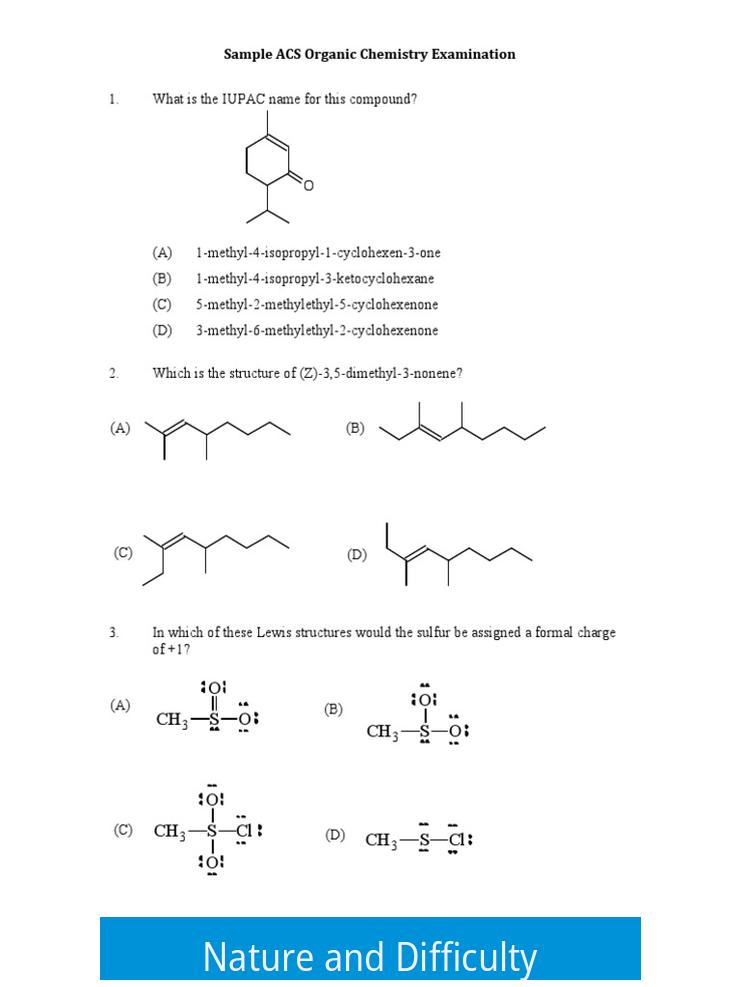
The ACS exam is known for its rigor. It demands mastery of organic chemistry concepts and problem-solving skills that often go beyond typical classroom exams. Many students face difficulties due to the comprehensive scope and the high standard of questions. Preparation must be strategic and thorough.
Variation in Teaching vs Exam Style
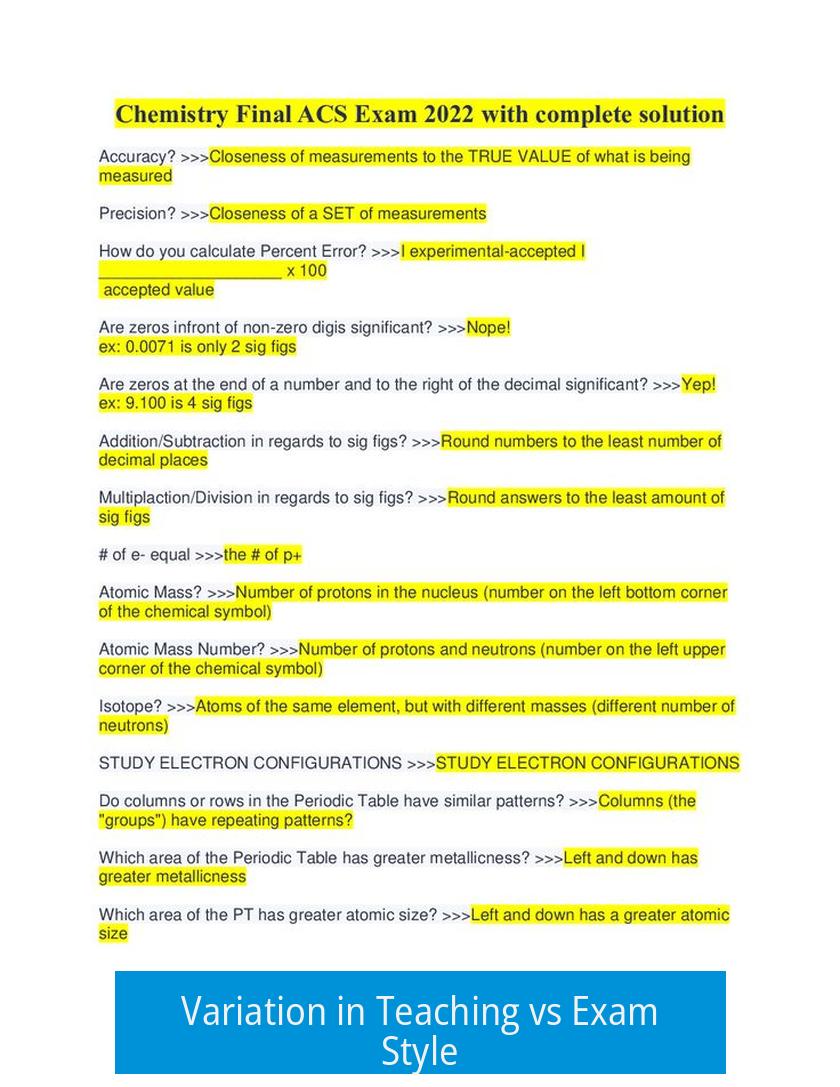
Individual instructors vary greatly in their teaching methods, which often do not match the ACS exam style. For example, some teachers may de-emphasize nomenclature, while others stress it heavily. This inconsistency can confuse students who rely solely on course lectures for exam preparation. The ACS exam wording and question types tend to be standardized and sometimes unfamiliar.
Cumulative and Comprehensive Coverage
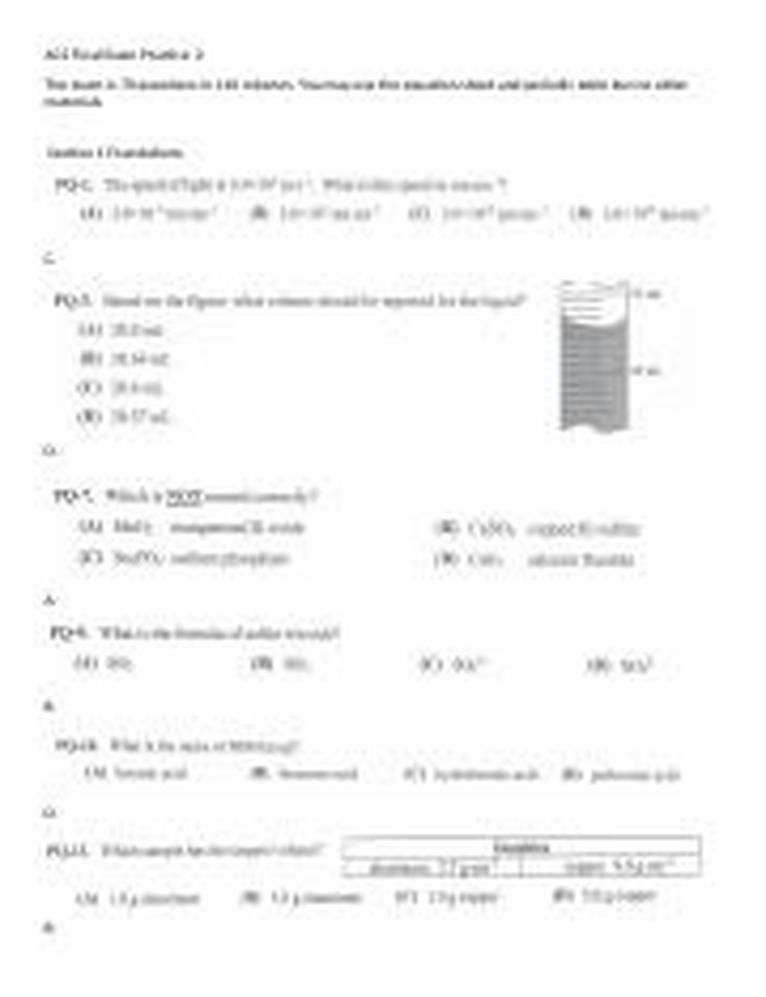
The ACS final covers all topics taught in the course, making it cumulative. Success requires a deep understanding of the entire syllabus, not just selected parts. Mistakes repeated across problems can lower scores significantly. Students must study consistently over weeks rather than cramming last minute.
Grading Impact and Context
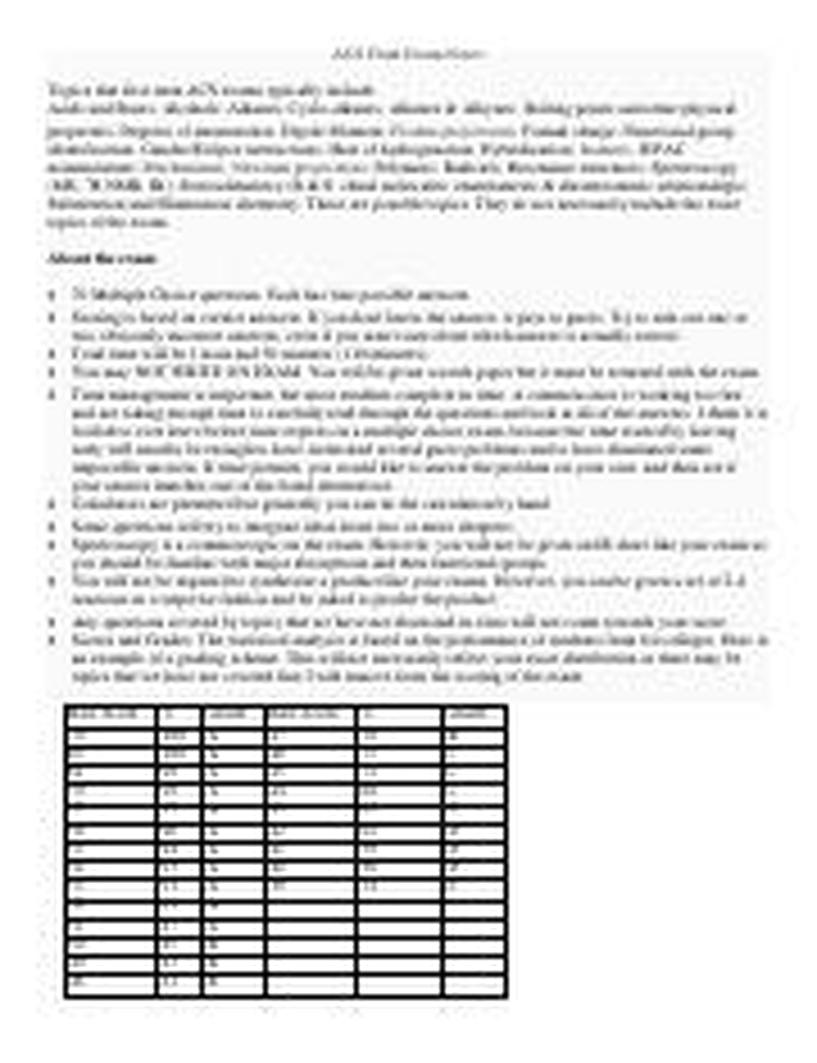
ACS scores reflect not only student knowledge but also instructor and course rigor. Grades can appear harsh because the test is less forgiving than typical classroom exams. For example, a 52% might seem low but could be above the national average, possibly placing a student in the 60th percentile or higher. Many schools curve grades based on these metrics.
Recommended Study Strategies
- Use official ACS study guides and practice tests to familiarize with the exam format.
- Seek help from instructors or tutors to strengthen weak areas.
- Focus studying on problem-solving techniques rather than memorizing lecture content alone.
- Begin studying weeks in advance to build sustained comprehension and retention.
Key Takeaways
- The ACS Final is a rigorous standardized exam for organic chemistry students nationwide.
- Teaching styles differ; exam questions may not align with classroom instruction.
- The test is cumulative and covers all course material, requiring extensive preparation.
- Grades can be harsh but often reflect national percentile norms.
- Use official study guides, practice extensively, and seek help early for best outcomes.
Mastering the ACS Final: A Real Talk Guide to Surviving and Thriving
If you’re about to face the ACS Final, here’s the hard truth: it’s *hard as crap*. This exam is the ultimate showdown, pitting your organic chemistry skills against the best students nationwide—including those with Ivy League polish. The ACS Final isn’t just another test; it’s a standardized, brutal comparison of knowledge. So, what makes it so daunting? And how do you conquer it without losing your mind? Let’s unpack the nuances.
Why Is the ACS Final Hard? Spoiler: It’s Not Your Average Exam
The ACS Organic Chemistry exam is designed nationally to measure organic chemistry competence. This means your grade reflects how you stack up nationwide, not just in your cozy classroom. Imagine your professor giving lessons with a certain style, while the ACS test sneaks in curveballs with phrases and problem types they never mentioned. It’s like playing chess but being handed checkers rules mid-game.
Teachers bring their own flavor to organic chemistry. One might live and breathe nomenclature, drilling it into your head every class. Another might give it a casual nod, instead spotlighting mechanisms or synthesis. This mismatch can trip students up, making the ACS exam feel like learning an alien dialect of chemistry despite acing your course.
Cumulative = Comprehensive = No Weak Spot Is Safe
The ACS final covers *everything* learned throughout the course. If you let one concept slide, such as a minor detail in stereochemistry or a reagent’s function, it can snowball into a cascade of errors on the test.
Think of this exam as a marathon, not a sprint. Cramming the night before rarely pays off. Weeks of steady practice, drilling problems, and reviewing notes is what prepares you for the barrage of questions. Repetition is your friend here—but smart repetition focused on your weak points, not just mindless flashcards.
Grades, Curves, and Why Your 52% Might Feel Like a Punch
Let’s not sugarcoat it: scoring 52% on the ACS final feels rough, especially when it drags your overall course grade down. But remember, this grade often doesn’t reflect *your* professor’s leniency or teaching style. The ACS is famously strict, exacting, and unforgiving. So a low ACS score might not doom your entire semester, especially if your school applies a grading curve factoring in the national performance on the exam.
One student shared that despite a 52%, their school usually curved such scores up, potentially still earning an A with some generosity. This contrast between ACS scoring and classroom grading can frustrate students, but it highlights the ACS’s unique role: a tough national benchmark.
Smart Strategies to Crack the ACS Code
Overwhelmed? Don’t be. Preparation is your weapon. Start with the official ACS Study Guide. It’s not just another textbook—it’s the secret sauce to understanding the test format and question styles. Check your school library or grab a copy online. Working through official practice tests can give you a realistic feel for what to expect.
Ask yourself: Did you study the exam or just the class content? Many students mistakenly believe course notes suffice, but the ACS expects more nuance and precision. Use the official test booklets and sample problems. If something confuses you, seek help early. Professors, teaching assistants, or tutors can clarify tricky topics, from reaction mechanisms to stereochemistry.
Small study sessions over weeks beat massive all-nighters. Spread your effort, track progress on weak areas, and adapt your study focus based on practice test scores. After all, it’s not about memorizing facts—it’s about learning to think like the ACS exam writers.
Where Does Your Score Stand Nationwide?
Curious about your percentile score when you get your results? Don’t freak out over a 30%. Anecdotally, a 52% can place you around the 60th percentile nationally, meaning you’re doing better than more than half the test-takers. The ACS Orgo final is notoriously hard. Low percentages aren’t failures but signals to sharpen your approach next time.
Understanding this can ease the blow of what feels like a disappointing score. The ACS exam sets a very high bar for organic chemistry knowledge—targeting not only recall but application and problem-solving. Being above average nationally on such a test is no small achievement.
Final Thoughts: Embrace the Challenge
In the end, the ACS Final isn’t about crushing spirits but setting a high standard for organic chemistry mastery. Recognize its difficulty, respect its comprehensive scope, and tackle it with serious prep and smart strategy. Your hard work won’t just pay off in this test—it hones skills vital for any future chemist.
Feeling daunted is natural. But with a clear study plan and the right resources, you can conquer the ACS Final, come out wiser, and maybe even crack a smile at the challenge it threw your way.
Ready to get started? Grab that ACS Official Study Guide, mark your calendar for weeks of practice, and remember: it’s you vs the nation. May the organic chemistry odds be ever in your favor!
What makes the ACS Final more difficult than typical organic chemistry tests?
The ACS Final tests you against students nationwide, including those from top schools. It covers all material cumulatively and uses a strict, standardized format that can differ greatly from your class exams.
How do teaching styles affect preparing for the ACS exam?
Teachers vary in how they present material and phrase problems. Some focus heavily on topics like nomenclature, others less so. This variation means you must adapt your study approach to match the ACS exam style.
Is cramming effective for the ACS Final?
No. The exam requires weeks of steady study. Since it covers all course sections, rushing through content last minute often leads to repeating mistakes on tough problems.
How does the ACS score impact my overall grade?
The ACS grade can feel harsh since it’s standardized to national averages. Even a lower score like 52% might still be curved to a good final grade depending on your professor’s grading and the class average.
What study resources should I use to prepare for the ACS Final?
The best resource is the official ACS study guide and practice tests. They mimic the actual exam style. Also, seek help from professors or tutors to target weak areas.


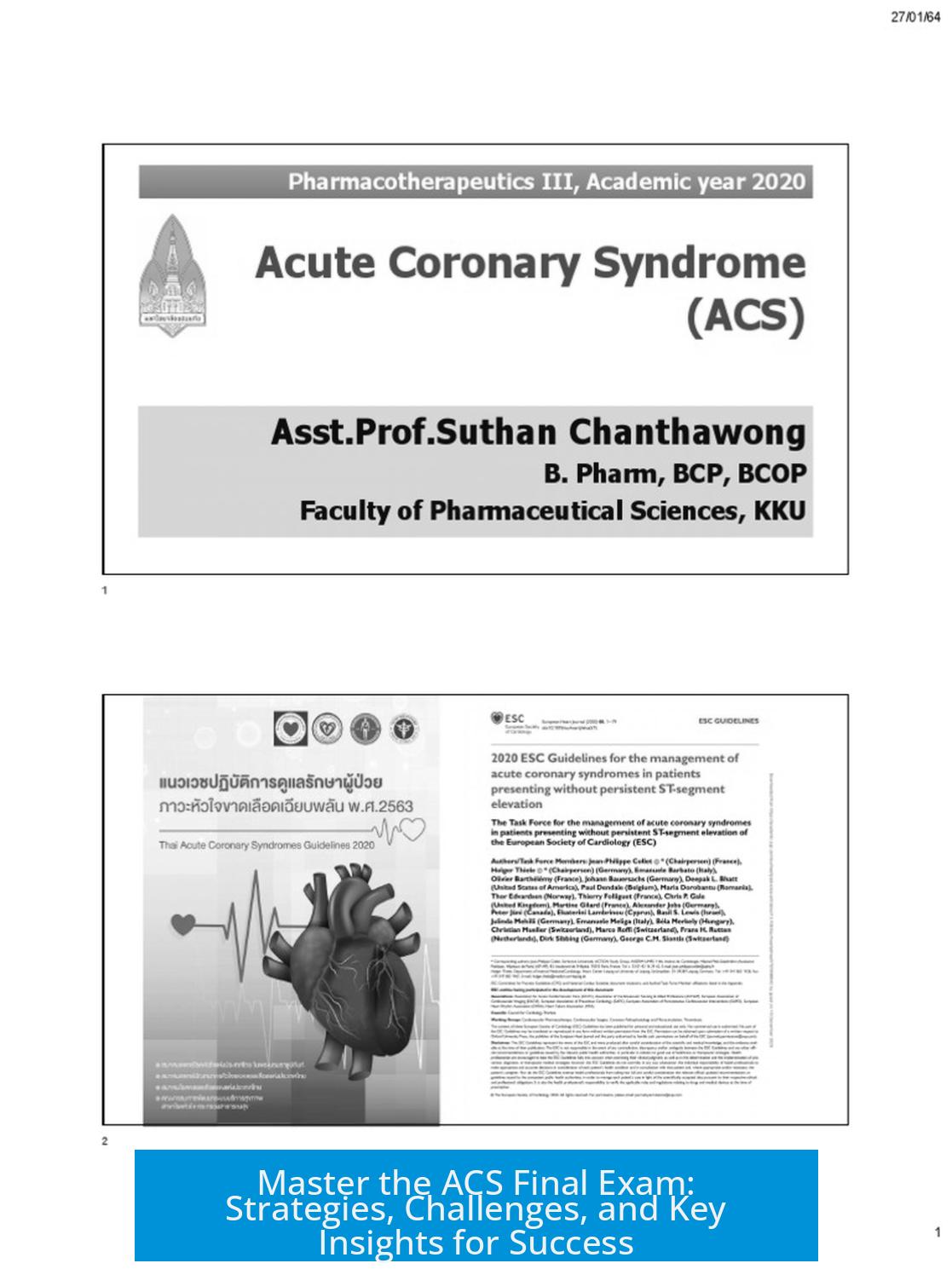


Leave a Comment